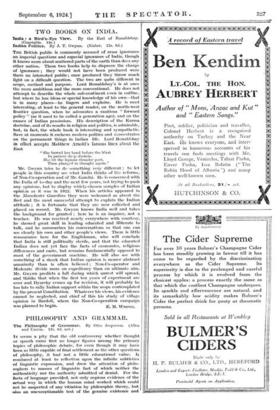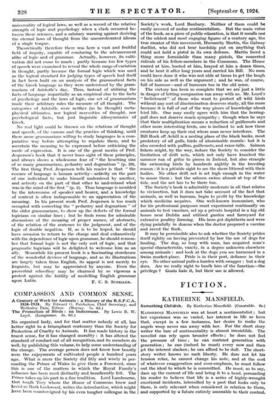The Philosophy of Grammar. By Otto Jospersen. (Allen and Unwin.
12s. 6d. net.) IT seems a pity that the old controversy whether thought or speech came first no longer figures among the primary topics of philosophic debate, for even though it may have been as little capable of final settlement as the other questions of philosophy, it had not a little educational value. it conduced at least to reflection upon the infinite subtleties of linguistic expression, and drew the attention of philo- sophers to masses of linguistic fact of which neither the authenticity nor the authority admitted of denial. For the facts of language provided, not only copious evidence of the actual way in which the human mind worked which could not be suspected of any vitiation by philosophic theory, but also, an unexceptionable test of the genuine existence and
universality of logical laws, as well as a record of the relative strength of logic and psychology when a clash occurred be- tween these sciences, and a salutary warning against deriving the eternal laws of thought from the uncorroborated idioms of a single tongue.
Theoretically therefore there was here a vast and fruitful field of inquiry, capable of conducing to the advancement alike of logic and of grammar. Actually, however, its culti- vation did not come to much ; partly because too few types of speech were examined to reveal the whole range of variation in thought, partly because the formal logic which was used as the logical standard for judging types of speech had itself in fact been built on an analysis of the grammatical facts of the Greek language as they were understood by the gram- marians of Aristotle's day. Thus, instead of utilizing the facts of language impartially as an empirical clue to the facts of psychology and the laws of logic, one set of grammarians made their arbitrary rules the measure of all thought. The categories of Aristotle were neither (as he thought) meta- physical ultimates, nor logical necessities of thought, nor psychological facts, but just linguistic idiosyncrasies of Greek.
No real light could be thrown on the relations of thought and speech, of the canons and the practice of thinking, until there arose grammarians willing to study languages in a com- parative way before attempting to regulate them, and to ascertain the meaning to be expressed before criticizing the mode of expression. It is one of the great merits of Prof. Jespersen's book that it never loses sight of these principles, and always shows a wholesome fear of " the besetting sins of so many grammarians, pedantry and dogmatism " (p. 29). The first thing Prof. Jespersen tells his reader is that " the essence of language is human activity—activity on the part of one individual to make himself understood by another, and activity on the part of that other to understand what was in the mind of the first (p. 2). Thus language is moulded by the intercourse of speaker and hearer, and a knowledge of context is often indispensable to an appreciation of the meaning. In his present work Prof. Jespersen is too much occupied with correcting the " pedantry and dogmatism " of the older grammarians, to show up the defects of the formal logicians on similar lines ; but he finds room for admirable discussions of the meaning of proper names, of abstracts, of the relation of the sentence to the judgment, and of the logic of double negation. If, as is to be hoped, he should have occasion to return to the charge and deal exhaustively with the dependence of logic upon grammar, he should remem- ber that formal logic is not the only sort of logic, and that pragmatic logicians will be delighted to welcome him as an ally. Meanwhile his present book is a fascinating storehouse of the wonderful devices of language, and as its illustrations are largely taken from English, its appeal is not merely to linguists, but may be appreciated by anyone. Even the proverbial schoolboy may be charmed by so vigorous a protest against the futility of modelling English grammar







































 Previous page
Previous page